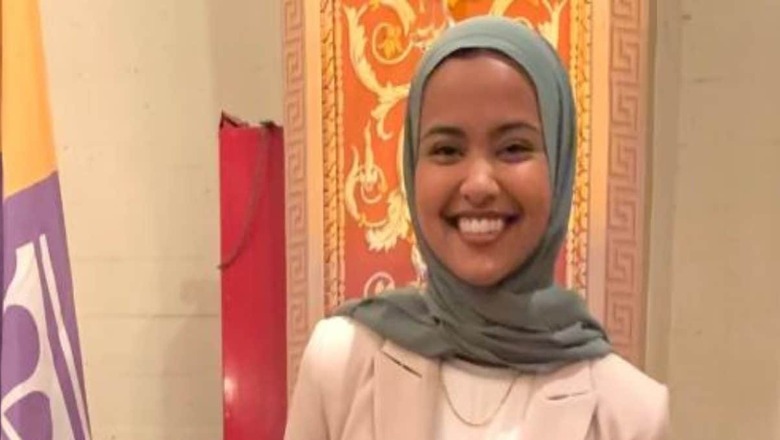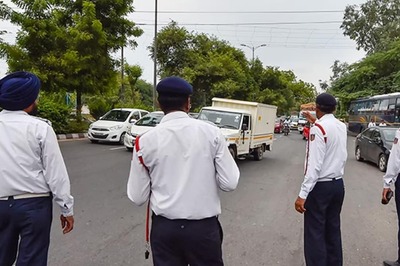
views
Class Valedictorian is a time-honoured tradition in US schools but also some universities. The student with the most outstanding record is generally given the honour and tasked with giving the valediction — farewell address — at the graduation ceremony. How much this has become politicised is highlighted by the controversy over Asna Tabassum being ‘cancelled’ from giving the valedictory address at the University of Southern California (USC) this year.
Tabassum was picked from a list of 100 ‘applicants’ for the class valedictorian honour. Time was when an outstanding grade point average (GPA) was the only prerequisite for the honour, but the need for “applications” indicates that many secure equal academic honours and hence other factors come into play, and a committee has to select the ‘winner’. Any criteria beyond grades means a degree of discretion, and Tabussum’s selection brings that process into focus.
According to various media reports, the recipient of the valedictorian honour at USC is determined by not only outstanding GPA — of which there were 236 students eligible this year, having achieved scores of 3.98 and above — but also involvement in university and community activities. There are interviews before the valedictorian and salutatorian (the secondary honour) are selected too, so the selection committee cannot have been unaware of any student’s views.
The 22-year-old “South Asian” origin student majored in biomedical engineering, but, intriguingly, took a minor in ‘Resistance to Genocide’, which her university states is “an interdisciplinary series of courses that researches the causes, results and representations of attempted genocide, as well as resistance to genocidal mass violence”. The course itself indicates the slant of the privately funded university, which has been on the radar of anti-Semitism watchdogs for a while now.
In December 2021 — long before the current resurgence of anti-Israel and anti-Jewish activism on campuses — some 60 USC faculty members sent an open letter to university officials to “publicly and explicitly rebuke” Yasmeen Mashayekh, a 21-year-old civil engineering student for her anti-Semitic online comments that year. The letter writers wanted the officials “to distance USC from her hateful statements”. Her tweets were removed but screenshots had reappeared.
Mashayekh had then been relieved of her paid mentoring position in the Viterbi School of Engineering but she still served as a diversity, equity and inclusion senator for the Viterbi Graduate Student Association. Among her more polite posts in 2021 was one saying “Death to Israel and its b–ch the US” but the officials told the letter writers that removing anyone from “a student-elected position based on protected speech” would be a violation of state law.
After this was brought to its attention by Jewish groups that had seen her posts, the Viterbi School posted on Instagram, “Even though the statements at issue are legally protected, we understand they are disturbing,” gratuitously adding “USC rejects and condemns hatred in all its forms.” At the time, Mashayekh had posted that she wanted “to normalize the language of resistance regardless of what that looks like,” and had reiterated her views on Israel, Zionism etc.
In an eerie hark-back, Asna Tabassum told a TV channel this week that she has no regrets over her social media activity. “I stand by exactly what I stand by,” she said, adding “I don’t believe it’s ironic for me to minor in something called resistance to genocide, speak out on it and then be revoked because I’m penalised for something that people have an issue with.” If she is going by what she has been taught, it begs more questions than just her selection as valedictorian.
The USC officials had to be aware of her choice of subjects when they chose her from a pool of 100 equally high-achieving applicants though she supposedly got the coveted honour for her additional efforts to arrange medical supplies from the US for Ukraine, and earthquake-affected areas of Turkey and Syria. That their choice would cause controversy must have also been known considering the worldwide reactions in universities across the world to the Israeli-Hamas war.
More so because, in the wake of the Israeli retaliation in the Gaza Strip after the 7 October 2023 killings and kidnappings, Palestinian solidarity protesters at USC were recorded chanting, “There is only one solution, Intifada revolution” and Jewish students expressed alarm and fear about open anti-Semitism on campus. Yet USC officials selected a student whose views — certain to be expressed during her speech — would not be conducive to peace or security on campus.
So the announcement this week by USC’s provost and senior vice president for academic affairs Andrew T. Guzman cancelling Tabassum’s address on 10 May on the grounds that it would present “substantial” security risks appears to be a case of what can charitably be called belated realisation. Why did the potential for mayhem at a ceremony expected to draw some 65,000 to the campus strike USC only after it had conferred the valedictorian honour on Tabassum?
Coincidentally, Tabassum was also valedictorian of her school — Ruben S Ayala High, Chino Hills, California — in 2020 and was listed as heading for a degree in bio-engineering as part of her pre-medical education. She was quoted by a local newspaper as having been inspired by her mother — “a teacher in India who flew across the world to give her kids a better life” — and her father, who was “the eldest son of his family who went on to become the valedictorian of his university”.
Also perhaps coincidentally, Tabassum belongs to the same department as Mashayekh—USC’s Viterbi School of Engineering — of which she served as co-chair of its student ambassador programme for 2022-23. The Viterbi School has strong ties with India and even has an India Advisory Board featuring corporate icons from NR Narayana Murthy to Kiran Mazumdar-Shaw. And Ratan Tata is one of the Life Trustees of the University of Southern California.
Amid the outrage over the ‘cancelling’ of Tabassum, Indians may recall the case of Rashmi Samant, the Indian student who was forced to resign soon after being elected President of the Oxford Union in the UK in 2021 due to her allegedly racist, transphobic and anti-Semitic social media posts, since she was supposedly unapologetic (initially) about them. There were no calls to support her by those who generally oppose the Jewish lobby, despite the weak allegations.
The first accusation of anti-Semitism was based on a pathetic pun she attempted in a 2017 post after seeing the Holocaust Museum in Berlin. The second was when she compared Cecil Rhodes to Adolf Hitler, which was hardly a new idea. The Rhodes Must Fall campaign that began in South Africa in 2015 quickly spread internationally and comparisons of the British imperialist to various odious personages have abounded since then. But that didn’t help Samant.
Those who usually make it their business to support whoever is accused of being anti-Semitic were curiously silent on Samant. That proved the speciousness of the claims that she was indeed anti-Semitic. In Tabassum’s case, the US Council on American-Islamic Relations stepped in to call the cancellation of her speech “cowardly” and safety concerns to be “disingenuous”. Anti-Jewish graffiti and sustained protests in campuses across the US notwithstanding, obviously.
From the vantage point of distance, it seems that USC was being either wilfully obtuse, or acceding to some hidden pressures or predilections when it came to selecting and then silencing Tabassum. But by acting in an unthinking manner, it has only exacerbated tensions at the worst possible time. Maybe Tabassum would have surprised (and perhaps even annoyed) all sides by advocating a non-partisan way ahead. Now we shall never know; sadly, neither will Tabassum.
The author is a freelance writer. Views expressed in the above piece are personal and solely those of the author. They do not necessarily reflect News18’s views.




















Comments
0 comment